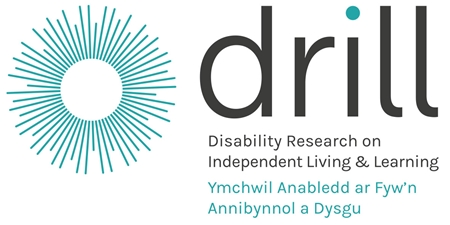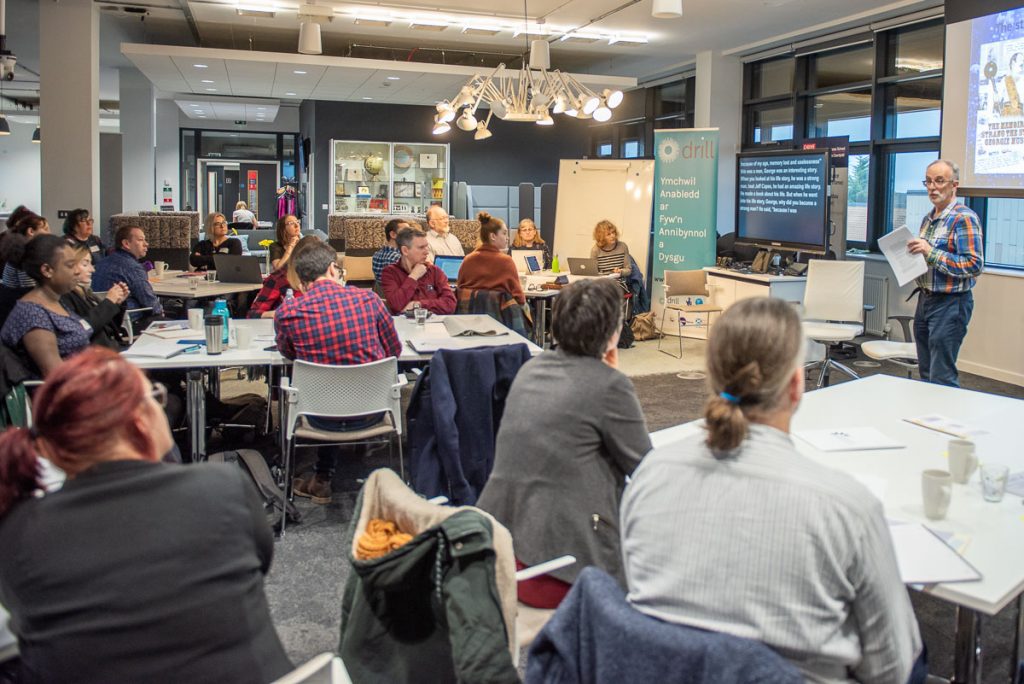Historically, research on disability has rarely included people with lived experience. Not only have disabled people been excluded from participating in research about our lives, but complex statistics or inaccessible research findings may preclude disabled people from understanding evidence and contributing to discussions about services or policies.
At the same time, disabled people have become suspicious of tokenistic inclusion, and when they have been invited to participate, their voices have often not been on a par with the views of professionals.

The DRILL Programme – which stands for Disability Research in Independent Learning and Living – has attempted to challenge the exclusion of disabled people in social research.
DRILL is an innovative, five-year UK wide Programme led by disabled people, for disabled people and funded by the National Lottery Community Fund (NLCF).
The Programme has been led by Disability Action NI in partnership with Disability Wales, Disability Rights UK and Inclusion Scotland.
One key aim of DRILL has been to facilitate research coproduction between disabled people and their organisations, academia, research bodies and policy makers.
DRILL in Wales
Wales has been lucky enough to receive DRILL funding for five research projects. These projects have explored a wide range of themes including the experiences of peer researchers, the career trajectories of disabled lawyers, the friendships of young people with learning difficulties, and an exploration of self-employment opportunities for disabled people.
These projects have all enabled disabled people to have a direct influence on decisions that impact our independent living, particularly in relation to policies and legislation.
One advantage of our location in Wales is that we have a much closer relationship to government as compared with our English-based counterparts, which allows for disabled people’s increased engagement.
Through DRILL, these five project teams have had the opportunity to present research evidence to several Members of Senedd at various high-profile events throughout the Programme.
For a smaller nation like Wales, DRILL’s impact has not been limited to policy change. Given that Wales has not benefitted from academic hubs such as a Centre for Disability Research – as other nations have – DRILL has played a crucial role in highlighting the wider relevance of coproduced social research to disabled people and DPOs in our nation.
Thanks to DRILL-funded activities in Wales, disabled people and DPOs have gained first-hand experience in leading research projects, becoming up-skilled in research coproduction, methods of evaluation, commissioning research and systematic reviews of literature.
Disabled people have seen what works in terms of sharing evidence accessibly and conducting ethical research.
The DRILL Wales advisory group – led by disabled people and disability rights activists – has driven the Programme and made decisions about which projects to fund. Our own organisation, Disability Wales, has led a research programme for the first time, developing DPO member expertise and in 2019 secured funding for a PhD studentship and several funded internships for disabled students.
Together, we are creating a repository of ‘good practice’ ethics/consent forms in accessible formats and have archived anonymised data so this can be re-used by others in the future.
Wales-based project teams have become part of research conversations by building networks with universities, third sector researchers and funding bodies.

Sharing key learning
Launched in 2015, DRILL is now drawing to a conclusion after an astonishing five years.
To mark its completion, Disability Wales is running a series of webinars to share key learning.
The first of these was last week, and included a discussion with the Deputy Minister and Chief Whip, Jane Hutt.
We hope you can join us at our next webinars, starting from September, to contribute to securing the legacy of this crucial programme for disabled people in Wales.
This post was written by our DRILL Programme Officer, Dr Jody Mellor. To find out more about the research, you can visit our DRILL project page.



